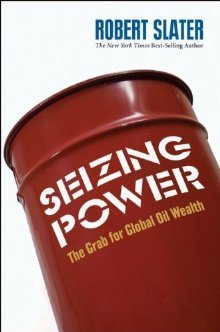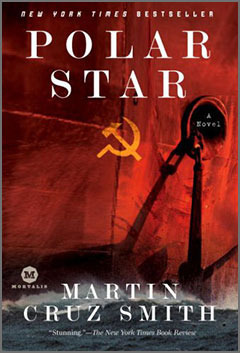Matt Rees's Blog - Posts Tagged "russia"
What's the difference between Sharansky and Lieberman? Apart from a few inches, not much
By Matt Beynon Rees, published on Global Post
JERUSALEM — So, there are two eastern European guys, one from Ukraine and the other from Moldova.
One of them is on the short side and is a chess whiz who suffered through a Siberian labor camp for his uncompromising belief in democracy and freedom. Meet Natan Sharansky, who was picked this weekend by Israeli Prime Minister Benjamin Netanyahu to lead the Jewish Agency for Israel.
The other is a beefy former nightclub bouncer who says nasty things about Arabs and is generally seen as just plain uncompromising. Meet Foreign Minister Avigdor Lieberman, who, it’s fair to say, is feared and loathed as a hardliner.
The two men couldn't carry themselves more differently and you don't have to be a longtime observer of Israel to know which one fits in better with the western diplomatic community and is most favored by America.
Trouble is they’re essentially the same guy.
Both reflect something unbending in current Israeli political thinking. But international diplomats will make a mistake if they ignore the reality signaled by the popularity of these two politicians and its consequences for the peace maneuvers that got underway this last week.
Sharansky pulled out of former prime minister Ariel Sharon’s government in 2005 to protest the Israeli withdrawal from its Gaza settlements and has since been occupying an office in a right-wing think thank in Jerusalem — when he hasn’t been touring the U.S. on high-paying speaking gigs.
Lieberman, meanwhile, lives in a settlement, drove his party to third place in the country’s February election with a promise of imposing a loyalty oath on Arab citizens of Israel, and, in his first statement as foreign minister, said "If you want peace, prepare for war."
That classically Lieberman aphorism prompted gritted teeth at the State Department, which sent special envoy George Mitchell to Ramallah and Cairo recently to prepare the U.S. plan for handling the new Israeli government.
But in their different ways, Sharansky and Lieberman are both saying the same thing: Israelis are tired of being pressured to hand over land to Palestinians, while the Palestinians ignore the world’s polite requests for an end to terrorism.
When I met with Sharansky just after he resigned from the cabinet in 2005, he explained what he had told Prime Minister Sharon when he went to his office to quit.
“One-sided concessions by us leave the Palestinians with their problems,” he said. “It’s an illusion to think international pressure on us will stop when we make concessions. We’re making terrorism legitimate. We dismantle settlements, terror continues, and the world will say we just didn’t dismantle enough.”
That’s how most Israelis tend to see things these days. (If you don’t believe that, check out the election results and witness the disappearance of the so-called left-wing parties.) And Sharansky's position is remarkably close to that of Lieberman. For example, instead of simply giving up the West Bank to the Palestinians, Lieberman has said that Israel ought to keep some of its settlement blocs and, in return, hand over parts of Israel where its Arab population lives to a new Palestinian state.
For Israelis, that would give them a sense of having driven a good bargain and received something in return for their concessions.
Western observers may not see things that way, but now they know what Israelis think. And Israelis are the ones that count.
So maybe we need to look for the difference between the two men for a hint of how we ought to interpret their positions.
The answer: democracy.
Sharansky, 61, wrote “The Case for Democracy” in 2004. It was a favorite of George W. Bush. It argued that the dictatorial Arab regimes couldn’t make peace with democratic Israel — totalitarian regimes need an enemy to demonize. The west needed to make the Arab countries democratic, instead of bolstering dictators.
We all like democracy, of course. So thumbs up for Sharansky, whose book went onto The New York Times bestseller list.
Lieberman, on the other hand, is generally portrayed as rather Stalinist in his approach to dissent and minorities. That earns him the Bronx cheer from the media.
The thing to remember is that it also earned him 15 seats in the parliament, leadership of the second-biggest party in the new coalition government, and the foreign minister’s chair.
Sharansky, by contrast, is being nominated to lead a body whose main function in these days of falling immigration is to encourage Jews in the diaspora to remain connected to their community. (Jewish Agency officials fear the dwindling population of Jews worldwide through intermarriage, and cite 50,000 new “former Jews” each year around the world due to assimilation.)
The former dissident Sharansky will be the lovable face of Israel’s new tough line and may even make it to the (ceremonial) president’s mansion in a few years. But it’s Lieberman who wields power.
JERUSALEM — So, there are two eastern European guys, one from Ukraine and the other from Moldova.
One of them is on the short side and is a chess whiz who suffered through a Siberian labor camp for his uncompromising belief in democracy and freedom. Meet Natan Sharansky, who was picked this weekend by Israeli Prime Minister Benjamin Netanyahu to lead the Jewish Agency for Israel.
The other is a beefy former nightclub bouncer who says nasty things about Arabs and is generally seen as just plain uncompromising. Meet Foreign Minister Avigdor Lieberman, who, it’s fair to say, is feared and loathed as a hardliner.
The two men couldn't carry themselves more differently and you don't have to be a longtime observer of Israel to know which one fits in better with the western diplomatic community and is most favored by America.
Trouble is they’re essentially the same guy.
Both reflect something unbending in current Israeli political thinking. But international diplomats will make a mistake if they ignore the reality signaled by the popularity of these two politicians and its consequences for the peace maneuvers that got underway this last week.
Sharansky pulled out of former prime minister Ariel Sharon’s government in 2005 to protest the Israeli withdrawal from its Gaza settlements and has since been occupying an office in a right-wing think thank in Jerusalem — when he hasn’t been touring the U.S. on high-paying speaking gigs.
Lieberman, meanwhile, lives in a settlement, drove his party to third place in the country’s February election with a promise of imposing a loyalty oath on Arab citizens of Israel, and, in his first statement as foreign minister, said "If you want peace, prepare for war."
That classically Lieberman aphorism prompted gritted teeth at the State Department, which sent special envoy George Mitchell to Ramallah and Cairo recently to prepare the U.S. plan for handling the new Israeli government.
But in their different ways, Sharansky and Lieberman are both saying the same thing: Israelis are tired of being pressured to hand over land to Palestinians, while the Palestinians ignore the world’s polite requests for an end to terrorism.
When I met with Sharansky just after he resigned from the cabinet in 2005, he explained what he had told Prime Minister Sharon when he went to his office to quit.
“One-sided concessions by us leave the Palestinians with their problems,” he said. “It’s an illusion to think international pressure on us will stop when we make concessions. We’re making terrorism legitimate. We dismantle settlements, terror continues, and the world will say we just didn’t dismantle enough.”
That’s how most Israelis tend to see things these days. (If you don’t believe that, check out the election results and witness the disappearance of the so-called left-wing parties.) And Sharansky's position is remarkably close to that of Lieberman. For example, instead of simply giving up the West Bank to the Palestinians, Lieberman has said that Israel ought to keep some of its settlement blocs and, in return, hand over parts of Israel where its Arab population lives to a new Palestinian state.
For Israelis, that would give them a sense of having driven a good bargain and received something in return for their concessions.
Western observers may not see things that way, but now they know what Israelis think. And Israelis are the ones that count.
So maybe we need to look for the difference between the two men for a hint of how we ought to interpret their positions.
The answer: democracy.
Sharansky, 61, wrote “The Case for Democracy” in 2004. It was a favorite of George W. Bush. It argued that the dictatorial Arab regimes couldn’t make peace with democratic Israel — totalitarian regimes need an enemy to demonize. The west needed to make the Arab countries democratic, instead of bolstering dictators.
We all like democracy, of course. So thumbs up for Sharansky, whose book went onto The New York Times bestseller list.
Lieberman, on the other hand, is generally portrayed as rather Stalinist in his approach to dissent and minorities. That earns him the Bronx cheer from the media.
The thing to remember is that it also earned him 15 seats in the parliament, leadership of the second-biggest party in the new coalition government, and the foreign minister’s chair.
Sharansky, by contrast, is being nominated to lead a body whose main function in these days of falling immigration is to encourage Jews in the diaspora to remain connected to their community. (Jewish Agency officials fear the dwindling population of Jews worldwide through intermarriage, and cite 50,000 new “former Jews” each year around the world due to assimilation.)
The former dissident Sharansky will be the lovable face of Israel’s new tough line and may even make it to the (ceremonial) president’s mansion in a few years. But it’s Lieberman who wields power.
Review: the new oil curse
 Seizing Power: The Grab for Global Oil Wealth by Robert Slater (Bloomberg Press, $29.95)
Seizing Power: The Grab for Global Oil Wealth by Robert Slater (Bloomberg Press, $29.95)Just when Goldman Sachs had you convinced that Wall Street would be the instrument of global doom, this excellent primer on the future of oil arrives to demonstrate that the specter of diminishing crude reserves could be just as lethal. And not just to the world economy.
The “petroaggressors” of Robert Slater’s new book aren’t the usual Middle Eastern suspects. “Seizing Power” lifts the veil on a major shift in the oil business that brings enormous wealth and power to relatively small dictatorships and represents another tool with which China, for one, has stolen a jump on the United States.
Slater, biographer of hedge-fund kingpin George Soros and former General Electric chief executive Jack Welch, lays out the history of the world oil markets from colonial speculation, to dominance by the massive oil conglomerates known as the “Seven Sisters,” through partial or complete nationalization by developing countries, and on to the current nervous state of flux. He does this with a wealth of statistics, and with case studies of big time petroaggressors, like Venezuelan President Hugo Chavez, and the more common corruption of the hoodlums at the helm of Chad, an African nation whose rulers skim off oil money and aid while its people languish in poverty.
The rise in oil prices in the middle of the last decade — coming after the Sept. 11 attacks and war in Iraq — gave the likes of Chavez even more of a stick with which to beat the West. “The petroaggressors had always been strident, flexing their muscles inordinately, making threats, or delivering ultimatums to the West,” Slater writes. “However, the new oil wealth pouring into their coffers gave them an even greater capacity to throw their weight around.”
Why? Because Western oil companies know the oil is running out — reserves may be played out within 50 years and certainly within a 100, writes Slater, quoting latest estimates. “‘When there’s a lack of oxygen,’” Slater quotes an oil analyst, “‘we all want the tank.’” So oil companies are forced to enter unstable political environments and to pay ever larger fees for doing so. The risks are enormous (though that hasn’t stopped oil companies making equally enormous profits. Yet.)
Read the rest of this post on my blog The Man of Twists and Turns.
Published on December 15, 2010 09:39
•
Tags:
bloomberg-press, bolivia, book-reviews, chad, goldman-sachs, hugo-chavez, middle-east, oil, opec, prius, robert-slater, russia, seizing-power, september-11, venezuela, wall-street
Renko Rules
 This is a crime fiction blog. So we ought to shoot straight. Here it is: there are lots of crappy detective novels out there. Which is why I say thank God for Arkady Renko.
This is a crime fiction blog. So we ought to shoot straight. Here it is: there are lots of crappy detective novels out there. Which is why I say thank God for Arkady Renko.The hero of Martin Cruz Smith’s excellent series set in the Soviet Union and, later, Russia (with stops in Cuba, Ukraine, Germany and Alaska) is the closest today’s crime fiction gets to Chandler’s idea that “down these mean streets a man must go who is not himself mean.” In many ways, Cruz Smith is the closest among current crime writers to the keen yet elliptical style of plot development perfected by Chandler. (In Chandler’s case, that was, as
he admitted, largely because he didn’t really keep track of the plot; I
suspect that’s not the issue with Cruz Smith.)
[Note: To qualify my lead paragraph, I ought to quote Chandler once again:
“There are as many bad literary novels as bad detective novels. The bad
literary novels just don’t get published.” That’s not true anymore, as
anyone who’s ever tossed a copy of Philip Roth’s “The Plot Against America”
at the wall will vouch. Still detective fiction retains that reputation among certain circles, and indeed a lot of crap still washes through the sleuthing sluices.]
I’ve read all the Renko novels, as well as some of Cruz Smith’s standalone
books. From the perspective of a writer, I’ve observed with enormous
pleasure the elements that make Renko work so well, and of course the
manner in which Cruz Smith puts them to effect.
A key to this is Renko’s voice. His apparently deep disillusion is something of a trick. Renko’s father was a Stalinist general and as an investigator he’s constantly measuring himself against that old bastard – and regretting the similarities he finds. This continuity between the old USSR and the new FSU grounds Renko. It’s why he’s not a drunk like some of his colleagues, and why he isn’t corrupt like the others: he’s a hard-edged idealist, like his father, who happens to have inherited the humanity of his mother.
Cruz Smith’s Russia is the perfect backdrop for Renko’s tawdry shining
armor. After the collapse of the Soviet Union, Cruz Smith has painted the
breakdown of society better than any nonfiction or journalism I’ve read.
It’s what I’ve tried to do with my Palestinian crime novels.
Read more of this post on my blog The Man of Twists and Turns.
Published on November 17, 2011 05:38
•
Tags:
arkady-renko, crime-fiction, martin-cruz-smith, russia, soviet-union, writing
If you read only one Martin Cruz Smith, read Polar Star
Isolated on an arctic ship, Cruz Smith’s detective is even more heroic
 What? If you read only one thriller by Martin Cruz Smith, it's not Gorky Park, one of the biggest hit thrillers of the last 40 years and the basis of that great movie with William Hurt? No, not even one of Martin Cruz Smith’s books set in Moscow. Polar Star is the Cruz Smith novel with the greatest tension and the biggest challenges to his hero, Arkady Renko.
What? If you read only one thriller by Martin Cruz Smith, it's not Gorky Park, one of the biggest hit thrillers of the last 40 years and the basis of that great movie with William Hurt? No, not even one of Martin Cruz Smith’s books set in Moscow. Polar Star is the Cruz Smith novel with the greatest tension and the biggest challenges to his hero, Arkady Renko.
 After Gorky Park, Renko goes into self-imposed exile gutting fish in the frozen Arctic Ocean. On the creaking Polar Star he uncovers a murder that becomes a bigger conspiracy. By putting Renko on the isolated ship, Cruz Smith highlights his heroic and honorable qualities. The same traits he showed in Gorky Park and which have carried him marvelously through six subsequent novels.
After Gorky Park, Renko goes into self-imposed exile gutting fish in the frozen Arctic Ocean. On the creaking Polar Star he uncovers a murder that becomes a bigger conspiracy. By putting Renko on the isolated ship, Cruz Smith highlights his heroic and honorable qualities. The same traits he showed in Gorky Park and which have carried him marvelously through six subsequent novels.
Cruz Smith has some wonderful Renko novels. Which is your favorite? Let me know.
Click to get a FREE ebook of my crime stories.
 What? If you read only one thriller by Martin Cruz Smith, it's not Gorky Park, one of the biggest hit thrillers of the last 40 years and the basis of that great movie with William Hurt? No, not even one of Martin Cruz Smith’s books set in Moscow. Polar Star is the Cruz Smith novel with the greatest tension and the biggest challenges to his hero, Arkady Renko.
What? If you read only one thriller by Martin Cruz Smith, it's not Gorky Park, one of the biggest hit thrillers of the last 40 years and the basis of that great movie with William Hurt? No, not even one of Martin Cruz Smith’s books set in Moscow. Polar Star is the Cruz Smith novel with the greatest tension and the biggest challenges to his hero, Arkady Renko. After Gorky Park, Renko goes into self-imposed exile gutting fish in the frozen Arctic Ocean. On the creaking Polar Star he uncovers a murder that becomes a bigger conspiracy. By putting Renko on the isolated ship, Cruz Smith highlights his heroic and honorable qualities. The same traits he showed in Gorky Park and which have carried him marvelously through six subsequent novels.
After Gorky Park, Renko goes into self-imposed exile gutting fish in the frozen Arctic Ocean. On the creaking Polar Star he uncovers a murder that becomes a bigger conspiracy. By putting Renko on the isolated ship, Cruz Smith highlights his heroic and honorable qualities. The same traits he showed in Gorky Park and which have carried him marvelously through six subsequent novels.Cruz Smith has some wonderful Renko novels. Which is your favorite? Let me know.
Click to get a FREE ebook of my crime stories.
Published on March 17, 2014 00:56
•
Tags:
crime-fiction, gorky-park, if-you-read-only-one, martin-cruz-smith, polar-star, russia, thrillers, writing



